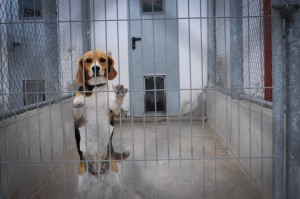When I was a kid in the eighties, the anti-vivisection lobby was quite trendy. Everyone I knew bought their cosmetics and toiletries from The Body Shop as they were against animal testing (unfortunately these days they’re owned by L’Oreal) and those who broke into laboratories to liberate bunnies were heroes. Off colour jokes were made about smoking Beagles as Jason and Kylie blasted out of the radio. Then after that I think everyone, in Britain anyway, thought that animal testing had been given up to make way for kinder, more modern methods of safety testing. I hate to say it, but it was as recently as 2013 when Europe decided to make the testing of cosmetics on animals illegal, but only for new products. That means there’s still plenty of shampoos, eye shadows and hairsprays on the market that have been tested on the aforementioned bunnies. Cruelty Free International (formally BUAV) have a campaign going on at the moment to ban the testing of household products on animals. Even though the current government pledged to dramatically reduce the number of animal experiments, they seem to have forgotten all about it.

So what’s happening? Well, good question. There are many companies, including the Co-op, Sainsbury’s and Marks and Spencer, who have had cruelty free cosmetics for a number of years and cruelty free household products are available from many supermarkets as well as online. Fine. So it’ll just be a matter of time in Europe before all the old, cruel products become obsolete and the companies that produce them will have to think of other methods of testing when they want to wow us with new products. Well, yes and no. There are loopholes in the legislation and also cosmetics companies who want to sell to China have to, under Chinese law, test everything on animals. So, it’s complicated.
Ok, you say, so if I’m a conscientious shopper I can obtain all my beauty products guilt free in the UK. True, but what about medicine? This has always been a sore point, as it is the law in the UK that you have to test any new drug on a non-human animal i.e. someone who has a working respiratory and cardiovascular system who won’t sue you if things go awry. Again, during my youth, as I was known to be an ‘animal rights sympathiser’ against the cruelty of animal research, and even teachers used to challenge me ‘What if the only way to find out if a drug was safe was to test it on an animal? What if that drug were to cure a disease you’re Mum or Dad had?’ Yes, my teachers were delightful.( It’s almost on a par with any question a vegan is asked that begins with ‘If you were on a desert island…’) The truth is that if the horrid business of animal testing were reliable, we’d have a real debate on our hands, but the fact is that it’s not.

Let’s take penicillin for example. Alexander Fleming originally tested the drug on rabbits and found it to be ineffective. (He may have thrown away the idea if he’d tested it on guinea pigs or hamsters, as it’s fatal to them.) However he was forced to try it on a very sick human patient as there were no alternatives. Here’s a direct quote from the co-discoverer and manufacturer of penicillin, who won a Nobel Prize for his efforts, “How fortunate we didn’t have these animal tests in the 1940s, for penicillin would probably never been granted a license, and possibly the whole field of antibiotics might never have been realized.” Now think about that for a while.
There are countless examples of animal experiments either delaying the release of an important drug (eg. muscle relaxants for general anaesthesia, organ rejection inhibitors, beta-blockers, pace-makers and heart valves amongst others) or of a drug testing as hunky-dory in animal toxicity tests and then going on to blind, injure or kill humans (eg. a first polio vaccine, thalidomide, ADHD medication, asbestos, smoking and countless others). So where does that leave us?
Well, happily, there are several charities lobbying against animal experimentation and some that even conduct human relevant research using modern techniques that mean no suffering to any animal, human or non-human. This research includes everything from skin sensitivities to leukaemia and diabetes, and is widely endorsed by patients, even those with very serious illnesses. New discoveries are being made all the time, without the use of rats, mice, rabbits, monkeys or dogs (yes, it is still legal in Britain to subject Beagles to all sorts of horrors). And as for the question as to whether I’d endorse animal experiments to save a relative or indeed myself, well, there are far more effective methods these days and I’d rather they were used. After all, we cured cancer in mice years ago…
